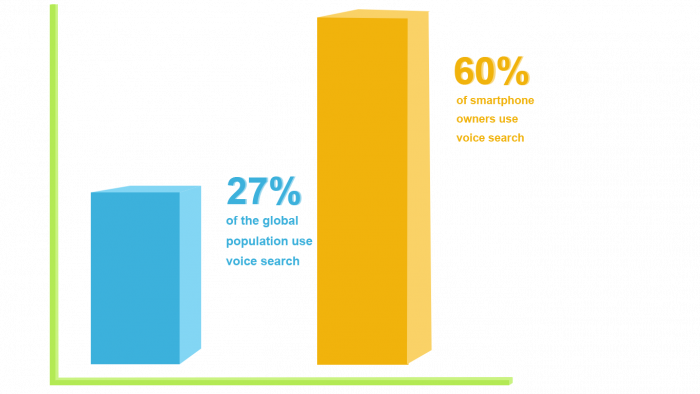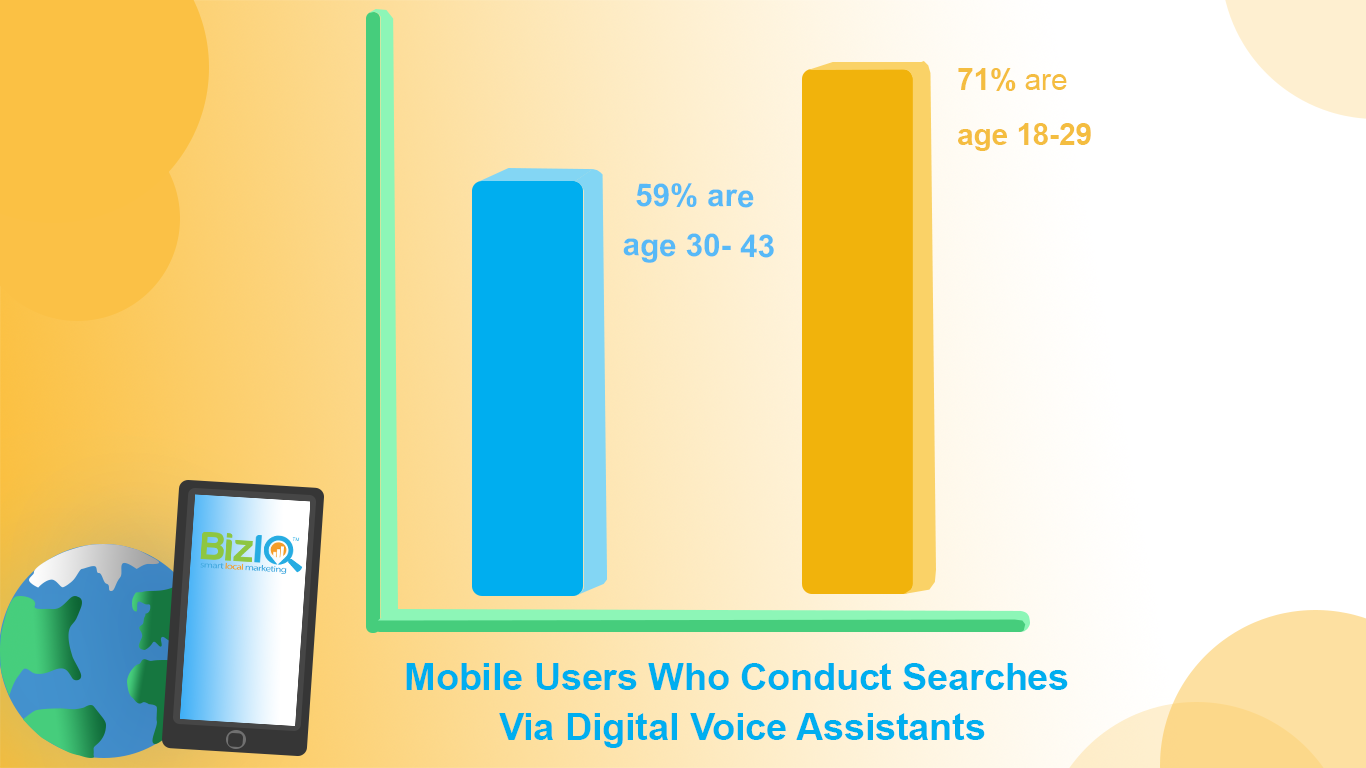Whatever you think about voice assistants, voice search, and voice answers, is your business prepared for the changes these technologies bring to how your business shows up in search results? Are you ready for voice search?
Studies by Gartner and MindMeld estimated that voice searches would account for between 30 and 50 percent of all online searches in the year 2020.
Whichever estimate turns out to be more accurate, the point is clear: voice search is proliferating among all age groups and represents a significant shift in the way people search for information, products, and services online.
Recent research shows that 4% of small business websites in the U.S. aren’t voice search ready.

If your local business is one of the 96 percent, then you need to get proactive or face losing out on potential customers and revenue.
However, with some improvements to your site and online strategy, you can give yourself a massive advantage over your competition and position yourself to profit from these new technological trends.
So what is voice search, exactly, and what is the difference between voice search, voice answers, and voice assistants.
What is voice search?
Voice search is an alternative to typing into the search bar in search engines.
Instead of using a keyboard to search online, a person clicks a microphone icon or speaks a phrase to activate voice search on their device.
After that, they “talk” to the software program or app and tell it their question or say a phrase about what they’re looking for.
Voice search comes in handy when you’re driving, or your hands are full. It’s also useful for people with disabilities that make it challenging or impossible to use a keyboard.
Voice search is available on both computers and smartphones. However, more voice searches are conducted using mobile devices than desktops or laptops.
Currently, 27% of the global online population use voice search.

Voice searches are popular among mobile device users, with over 60% of smartphone owners now doing voice searches.
Odds are your potential customers are performing voice searches on their phone.
What are voice assistants?
Voice assistants are software programs, sometimes referred to as bots, that not only allow you to perform a voice search, but also speak the answer using a digital voice.
In addition to voice searches, many voice assistants operate devices and appliances that are connected to them.
You can find voice assistants in things like smart speakers, smart appliances, your television, and in digital assistant devices like Amazon Echo or Google Home. Additionally, most new smartphones come with a voice assistant already included as part of their operating system or as a pre-installed app.
Voice assistants are also on the rise, with 59% of mobile users age 30-43 and 71% of mobile users age 18-29 using them regularly.

Voice assistants include:
➤ Google Assistant
➤ Apple Siri
➤ Microsoft Cortana
➤ Amazon Alexa
What are voice answers?
The spoken answers provided by voice assistants are called voice answers.
It’s important to point out that although many marketers lump voice answers and voice search under the term “voice search,” they aren’t quite the same.
But if you optimize for voice answers, you’re also going to be getting ready for voice search and in theory will rank better, because by optimizing for voice answers, you will show up on Google in position 0, otherwise known as featured snippets.
Online citation management and online listing management are vital components of Voice Search Readiness
A 2019 UK study by Uberall – which analyzed over 73,000 businesses – found that 37 online directories directly feed information to voice assistant and voice answer applications.
The top three, in order, were Google — including Google Maps and Google My Business, Yelp and Bing, but other platforms that feed contact and business info to voice search apps include Facebook, Foursquare, Factual and Amazon Alexa. BizIQ also feeds local business client information into Amazon Alexa.
So to get more traffic and customers via voice answers and voice search, you want to be ranking in those directories.
How to get voice search ready?
Here are four quick tips to improve the VSR of your website and your online marketing strategy:
 1. Optimize your company website for mobile users
1. Optimize your company website for mobile users
Since the majority of voice searchers are using smartphones and other mobile devices, it just makes sense that you should make sure your website is fully mobile-ready.
Your site should be using a responsive design that adapts its layout to fit the screen and orientation of the device your visitor is using.
Your content needs to also be mobile-friendly.
Content needs to be formatted for mobile readers, so you should be using short paragraphs (1-3 sentences max), plenty of subheadings, bullet point lists where applicable and optimized visual content as well.
 2. Include relevant content that focuses on spoken long tail keywords
2. Include relevant content that focuses on spoken long tail keywords
Since people speak differently than they type, your content should also be worded to attract voice searches.
People performing these types of searches often ask questions and use longer phrases than those performing typed searches in Google.
Therefore, your content should focus on long tail keywords that contain several words, as well as on question-and-answer formats that include the questions as subheadings, short answers below them and then more detailed answers further down the page.
 3. Maximize your online presence with apps, directories, and local citations
3. Maximize your online presence with apps, directories, and local citations
Google Voice Search, Siri and Alexa all use external sites and apps like Yelp to locate businesses for mobile voice searchers.
These rely heavily on the local contact information listed in the apps when determining relevance, so it’s crucial that your business name, address and phone number (NAP) is consistent across all of these 3rd party platforms. And you own listings on many of them!
Listings management is a big part of effective local SEO services. It’s crucial you take the time to make sure your NAP and business hours are consistent all over the web. That includes on your website, on your directory listings, on Google My Business (GMB) and on review sites and apps like Yelp, Glassdoor, the Better Business Bureau (BBB) and Angie’s List, to name a few.
4 . Build your reputation online with customer reviews
. Build your reputation online with customer reviews
Now let’s talk about those review sites and apps.
Getting positive customer reviews on these platforms is one of the best things you can do to promote your company online. These reviews will be crucial to your success going forward since so many new customers will find you – or not – because of the number of positive reviews versus negative reviews.
They will also look at how you respond to both positive and negative reviews, so take the time to leave professional, courteous responses to all reviews that you get across all platforms.
Since these platforms directly feed voice search applications, your ability to get customers through voice search is directly impacted by your reviews. So please take them seriously.
Make VSR a priority, so you stay ahead of your competition
Voice search is multiplying in popularity among consumers, but many small businesses aren’t sure how to get ready. That creates an excellent opportunity for your business to get ahead of the competition by getting voice search ready now.
Along with adding your business information to voice search platforms and voice assistants, make sure you optimize your website and content for mobile devices, create content that addresses searcher questions, get your NAP consistent across the web and manage your online reputation well with customer reviews.
What are your doing to get your small business voice search ready?
Let us know in the comments below. And don’t forget to subscribe to the BizIQ blog for more marketing tips and strategies delivered right to your inbox!









